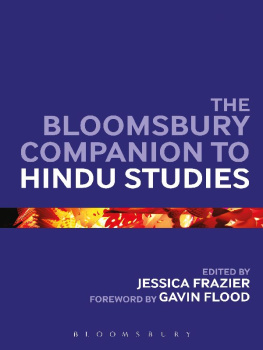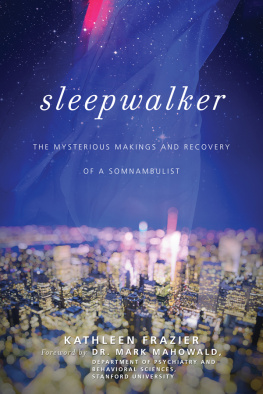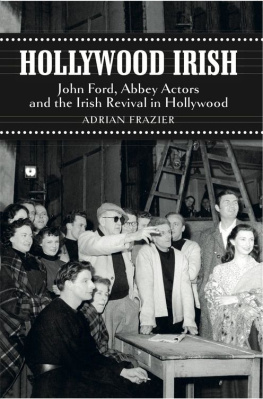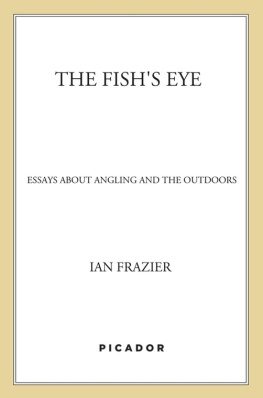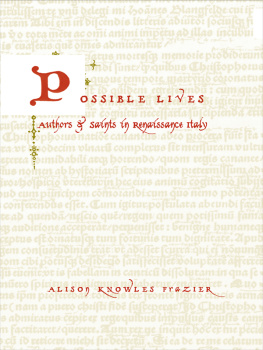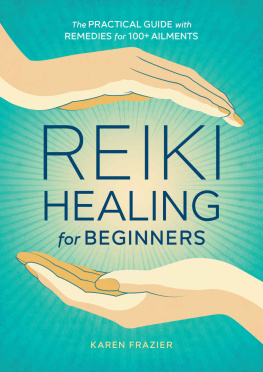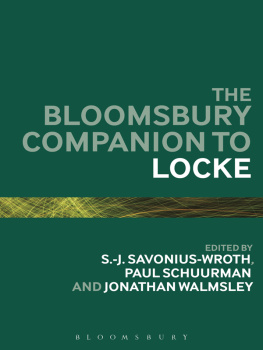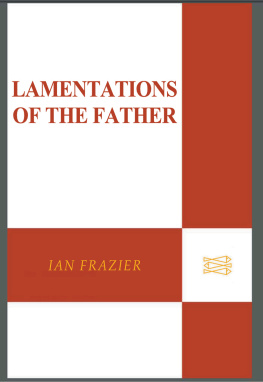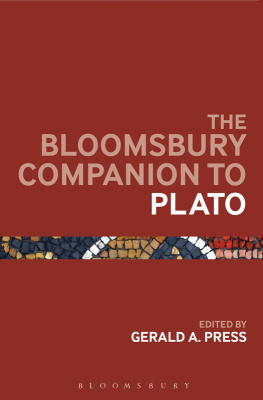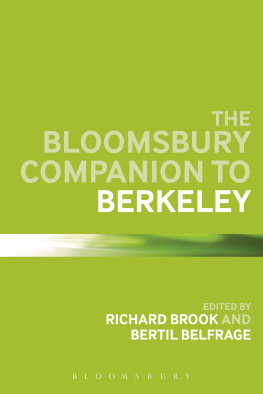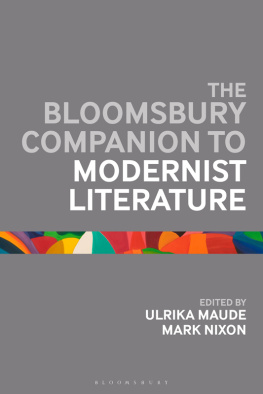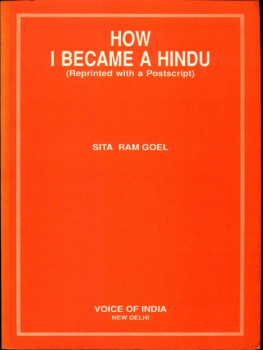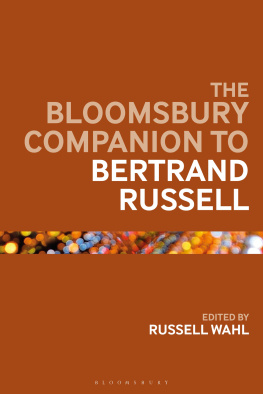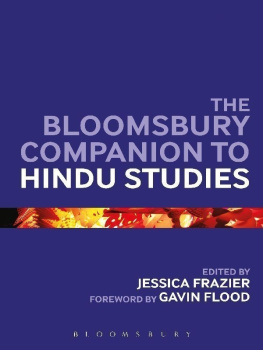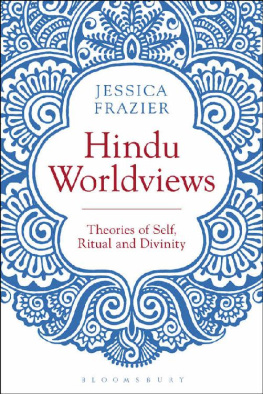Frazier - The Bloomsbury Companion to Hindu Studies
Here you can read online Frazier - The Bloomsbury Companion to Hindu Studies full text of the book (entire story) in english for free. Download pdf and epub, get meaning, cover and reviews about this ebook. City: London, year: 2014;2013, publisher: Bloomsbury UK;Bloomsbury Academic, genre: Religion. Description of the work, (preface) as well as reviews are available. Best literature library LitArk.com created for fans of good reading and offers a wide selection of genres:
Romance novel
Science fiction
Adventure
Detective
Science
History
Home and family
Prose
Art
Politics
Computer
Non-fiction
Religion
Business
Children
Humor
Choose a favorite category and find really read worthwhile books. Enjoy immersion in the world of imagination, feel the emotions of the characters or learn something new for yourself, make an fascinating discovery.
The Bloomsbury Companion to Hindu Studies: summary, description and annotation
We offer to read an annotation, description, summary or preface (depends on what the author of the book "The Bloomsbury Companion to Hindu Studies" wrote himself). If you haven't found the necessary information about the book — write in the comments, we will try to find it.
Frazier: author's other books
Who wrote The Bloomsbury Companion to Hindu Studies? Find out the surname, the name of the author of the book and a list of all author's works by series.
The Bloomsbury Companion to Hindu Studies — read online for free the complete book (whole text) full work
Below is the text of the book, divided by pages. System saving the place of the last page read, allows you to conveniently read the book "The Bloomsbury Companion to Hindu Studies" online for free, without having to search again every time where you left off. Put a bookmark, and you can go to the page where you finished reading at any time.
Font size:
Interval:
Bookmark:
The Bloomsbury Companion to Hindu Studies
Further volumes in the series of Bloomsbury Companions:
Hindu Studies, edited by Jessica Frazier, foreword by Gavin Flood
Islamic Studies, edited by Clinton Bennett
Jewish Studies, edited by Dean Phillip Bell
Religion and Film, edited by William L. Blizek
New Religious Movements, edited by George D. Chryssides and Benjamin E. Zeller
The Bloomsbury Companion to
Hindu Studies
Edited by
Jessica Frazier

Contents
Detailed Contents
Simon Brodbeck is a Research Fellow and Lecturer in the School of History, Archaeology and Religion at Cardiff University.
Jessica Frazier is a Research Fellow at the Oxford Centre for Hindu Studies, and Lecturer in Religious Studies at the University of Kent.
Dominic Goodall is Professor and head of the Pondicherry Centre of cole Francaise dExtreme Orient.
Brian Hatcher is Professor and Packard Chair of Theology at Tufts University.
Sondra L. Hausner is University Lecturer in the Study of Religion at the University of Oxford and Fellow of St Peters College.
Harunaga Isaacson is Professor of Classical Indology at Hamburg University.
Knut A. Jacobsen is Professor in the History of Religions at the University of Bergen.
David Peter Lawrence is Associate Professor at the University of North Dakota.
Marie Lecomte-Tilouine is a Researcher (directeur de recherche) at the Centre National for Himalayan Studies at the Centre de la Recherche Scientifique.
Angelika Malinar is Professor of Indology at the University of Zurich.
Karen Pechilis is Professor of Religious Studies at Drew University.
Kenneth Valpey is a Visiting Scholar at the Chinese University of Hong Kong and a Fellow of the Oxford Centre for Hindu Studie.
When we survey the cultures of South Asia that have become known as Hinduism, we are struck by the long histories involved in their formation, the broad sweep of the political and economic trajectories in which these traditions were formed and the innumerable stories of the people who lived through them. The story of Hinduism from one perspective is the story of the communities of solidarity with investment in a particular worldview, set of texts and spiritual practices that they perceived to be of vital importance for their community. Often these communities of solidarity were in conflict and one became subordinated or incorporated into another, but out of this complexity, coherent social structures and patterns of organizing knowledge emerged over a period of almost two thousand years up to what we might call the early medieval period when the deities, practices and architecture that we associate with contemporary Hinduism clearly emerged. Sacred texts, particularly the revealed scripture of the Veda but also traditions in vernacular languages, were passed through the generations and were received and made to live by each new generation. The Tamil poems of the vrs are still sung in Tamil Nadu as are the songs of Mirabai in the Punjab; Brahmins still perform the sacred thread ceremony and some still renounce the world to seek a goal beyond worldly succes. For many Hindus the present life is part of a much broader picture and might continue into future lives in different form. But this does not mean that Hindu traditions are divorced from day to day living; quite the contrary, Hindu forms of worship have informed peoples daily lives from mundane activities such as cooking a meal, to getting married, to beginning a business enterprise and to political action. Indeed, in the contemporary world the term Hindu is sometimes associated with a conservative political ideology that sees Hinduness (hindutva) as the heart of India as a nation, a vision that for many has had negative social consequence.
While the importance of Hinduism for national and international politics should not be underestimated, this book uses the term Hindu in a much broader fashion and indeed rescues it from that rather narrow designation. What have become known as Hindu traditions are essentially communities who pass what they regard as important knowledge through the generations; it is important for living a good life, important for realizing the legitimate goals of success, pleasure and virtue, important for paying our debts to the past and important for facing the future. These ways of life have brought people into community with each other and have provided the resources for the successful construction of life from birth, through marriage and family, to death. The term Hinduism has come to designate different communities of solidarity that are distinct from each other and yet related by shared concerns, shared structures and common practice.
This book is a welcome contribution to the way we understand Hinduism in its complexity, the way it has been understood and academically studied and the way it needs to be approached in future scholarship. Here we find accounts of these different communities united by devotion (bhakti), for example, or by Tantric revelation, along with a history of the scholarly reception of the texts, communities and practices in the history of South Asia in each of the academic discipline. Dr. Frazier and the other scholars involved in this project have presented a fresh and original approach that seeks to give a vision of Hinduism in its complexity and continuity, integrated with a reflection on the processes and methods of study. This book should be widely read.
Gavin Flood
This volume aims to highlight key debates, new perspectives, methodological tools and future possibilities for research in the study of Hindu tradition. As such it is not aiming at a comprehensive introduction, but rather a companion that can be used by students and scholars to throw new light onto material, and refine current approache. Such a project could expand indefinitely to reflect the work that is being done on newly emerging manuscripts and hitherto-unexplored practices; in comparison with that widening horizon of research, and due to the contingent limitations of the project, the present volume inevitably contains gap. The brief summary of regional traditions invites treatment in greater depth in a longer edited volume. Space has been given to Tantric traditions at the expense of the Vedas, in recognition of the need to balance the prevalent Vedic conception of Hinduism with awareness of the equal and in many cases stronger influence that the Tantric constellation of ideas and practices have had on popular belief and worship among the majority of todays Hindu. More could be said on Hindu philosophical and theological ideas; given the current flourishing of historical, political and sociological approaches, a balanced scholarly attention to salvific and metaphysical beliefs is also desirable as a future direction.
The book uses the standard transliteration of Indian alphabets, except in the use of some proper names, place names, titles, adjectives or popular anglicization.
Many thanks go to the scholars who have contributed to this volume, and to Carol Campbell, Douglas Frazier, Gavin Flood, Julius Lipner, Kirsty Schaper, Rembert Lutjeharms and the Oxford Centre for Hindu Studie. Their suggestions, support and patience have been essential. All inadequacies are, of course, very much my own.
Chapter Outline
This volume is dedicated to new visions of Hinduism, and what they tell us about religion and culture as a whole. In a time in which scholarship in the study of religion is simultaneously facing serious challenges and promising advances, the field of Hindu Studies is emerging as an exemplary model for religious studies. The rich complexity of the Hindu tradition, or as we may now say in the plural,
Next pageFont size:
Interval:
Bookmark:
Similar books «The Bloomsbury Companion to Hindu Studies»
Look at similar books to The Bloomsbury Companion to Hindu Studies. We have selected literature similar in name and meaning in the hope of providing readers with more options to find new, interesting, not yet read works.
Discussion, reviews of the book The Bloomsbury Companion to Hindu Studies and just readers' own opinions. Leave your comments, write what you think about the work, its meaning or the main characters. Specify what exactly you liked and what you didn't like, and why you think so.

